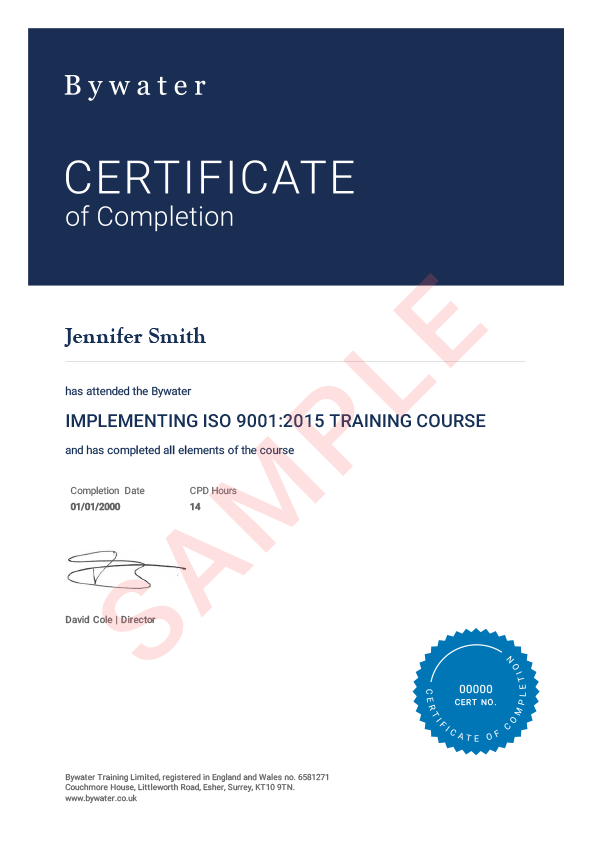ISO 9001 Implementation Training Course
DURATION
2 daysCPD
Equivalent to 14 hoursCERTIFICATES
All delegates will receive a certificate on completion.DELIVERY OPTIONS
Learn how to establish a quality management system (QMS) within your organisation that meets the requirements of ISO 9001:2015 on this interactive ISO 9001 Implementation training course.
- a process approach to management
- the identification of risks
- a systematic way of evaluating performance
- a customer-focused approach at the heart of the business
- continual improvement using the Plan-Do-Check-Act (PDCA) model
- certification
The course is built around a case study simulation, enabling attendees to benefit from a ‘real-world’ experience.
The implementation training course begins on day one with our Introduction to ISO 9001:2015 training course, which introduces the fundamentals of ISO 9001:2015. It includes analysis of the key clauses in the standard, giving delegates a working understanding of quality management and ISO 9001. On day two we explain the six phases of developing or converting a management system to be in line with ISO 9001 requirements:
- conducting a gap analysis as a base-line review
- identifying issues and interested parties
- developing policy, objectives and implementation programmes
- ensuring the integration of the QMS into business operations
- checking/measuring, audit and review
- initiating the certification process
Bywater also offers other ISO 9001 support services and can assist organisations with the implementation, maintenance and improvement of their QMS using experienced consultants. To read more about this please visit our ISO 9001 consultancy page.
It will also benefit managers, department heads and other staff members who wish to support a management system implementation project.
As the course incorporates our Introduction to ISO 9001:2015 training course, no prior knowledge is required.
- Overview and analysis of the structure and requirements of ISO 9001
- Quality Management Principles and the key components of a QMS
- Implications and benefits of an ISO 9001 QMS
- Developing high-level process maps
- Identifying key interested parties
- Risks and opportunities
- The process for a gap analysis, including exploring methods for effective results
- What is required to plan, implement and review an ISO 9001 QMS
- Support and maintenance of a QMS
- The pathway to successful certification
- The role of Certification Bodies
- understand the features and benefits of ISO 9001
- understand the process for a gap analysis and what is required to implement ISO 9001
- support others in applying and integrating ISO 9001 into existing business operations
On completion of the course, delegates will be sent a certificate of completion in recognition of their new ISO 9001 Implementation skills.

Upcoming course dates










On this course you will learn about the key principles of a QMS and how implementing a system will benefit your business. Our expert tutors will explain the techniques, such as gap analysis and process maps, that you can use to maximise success and minimise risk, and how to support a QMS based on ISO 9001 after implementation. Because we take a very practical approach to training, you will leave the course ready to apply your learning to implementing a QMS in a real-life situation.
The content and approach of the course means that it is of value to managers and other interested parties, as well as those who will actually be carrying out the implementation.
No, this course includes our Introduction to ISO 9001:2015 training course, which describes and explains the latest version of the standard, so you will gather all the knowledge you need during training.
Yes, you will receive a certificate of attendance, which demonstrates that you have gained an understanding of the principles of a quality management system and how it can be implemented within your organisation for greatest business benefit. You can use your certificate to share within your organisation, enhance your CV and add to your LinkedIn profile, to highlight your growing skills set.
You can record this course as equivalent to 14 hours of CPD.
You will be sent training materials which you will be using over the 2 days. If you have access to a copy of the ISO 9001:2015 standard, it may help you to follow the references in the course.
If you are attending a face-to-face course, you will need a laptop or similar, and possibly a notebook and pen.
Those attending the course in the Virtual Classroom will need audio-visual and connectivity equipment to access the online sessions, including a camera to make the most of the interactive style of the course. We will send you information about the platform we use and how to get online in good time.
Customer reviews
Janus International Europe Ltd|16th Jul, 2024
M Group Services|27th Jun, 2024
SGN|18th Jun, 2024
MARS Horsecare UK Ltd|17th Jun, 2024
Pulsar Measurement|3rd Jun, 2024
SERT Group Limited|21st May, 2024
Drumgrange Ltd|14th May, 2024
East Kent Hospitals University Nhs Foundation Trust|14th May, 2024
NIIT Limited UK|9th May, 2024
Huber+Suhner (UK) Ltd|15th Apr, 2024
The Iso Centre Ltd|21st Mar, 2024
McKay Training|19th Mar, 2024




